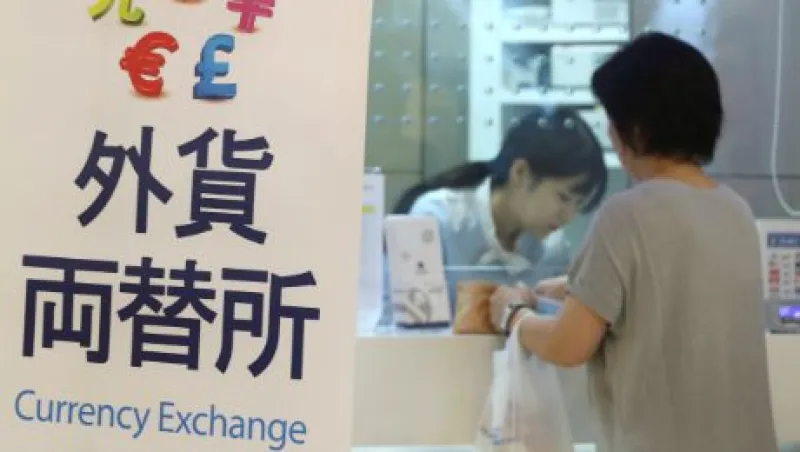For the first day since the devaluation this week that sent shock waves through global markets, the People’s Bank of China today raised the reference band for the yuan, with the domestic spot rate versus the U.S. dollar increasing by 0.11 percent. For emerging markets, the damage done by the devaluation concerns has been considerable. The Malaysian ringgit has slipped by nearly 3 percent this week versus the U.S. dollar, reaching the lowest point since 1998 in the wake of the Asian currency crisis. With commodity prices continuing to slide globally, investors continue to be wary of weaker economies highly levered to Chinese demand for raw goods.
Goldman Sachs Group buys GE banking unit. Goldman Sachs Group is acquiring $16 billion in online banking deposits and certificates of deposits from General Electric, the financial groups announced yesterday. General Electric has been divesting its financial services assets over the past several months; as for Goldman, the acquisition is part of a greater strategy to bolster liquidity via wider access to deposit funding.
Tesla raises size of offering. In a regulatory filing today, Tesla Motors increased the size of its secondary offering to 2.7 million shares in a bid to raise roughly $640 million. Tesla CEO Elon Musk has indicated that the company is building a capital war chest to provide security as it continues to expand its line of vehicles.
Banks reach settlement over forex manipulation charges. HSBC Holdings, Barclays, Goldman Sachs Group, BNP Paribas and Royal Bank of Scotland have reached a settlement with investors over charges of currency-market manipulation, subject to court approval. In addition to payments totaling more than $2 billion, the banks have agreed to cooperate as the suits continue against a group of other banks.
Europe sees lackluster growth. Second-quarter GDP data released today showed growth levels in Germany slightly lower than consensus projections at 0.4 percent versus the prior three months. France’s economy stagnated, with flat quarter-over-quarter readings on the back of weaker consumption. Euro zone aggregate GDP for the quarter came in at 0.3 percent versus the first quarter, also softer than consensus forecasts.
Greek saga nears end. After an all-night session, the Greek Parliament voted 222–64 (with 11 abstaining) in favor of accepting the terms negotiated with creditors. A special meeting of the Eurogroup, the finance ministers of the euro zone, will be held in Brussels today with provisions for a nearly $7 billion tranche to be advanced to Athens even if the creditors are not able to agree to accept the terms today.
Oil hits new multiyear low. Front-month futures contracts for West Texas intermediate grade crude oil traded at the lowest level in more than six years this morning, as energy markets continue to wrestle with strong supply data. On the heels of OPEC’s monthly report that showed production gains in July, the Energy Information Administration inventory report issued on Wednesday registered a 1.3 million barrel increase in Cushing inventory.
Portfolio Perspective: The Sharing Economy Is Good for Consumers, Bad for Investors — Ignacio Pakciarz, BigSur Partners
More than 20 years ago, there was a company called Webvan. Its mission: to deliver fresh produce and other high-quality groceries to users’ homes. The firm raised $800 million through venture capital firms and in 1999, went public with a strong IPO. In 2001, after their service proved to be too costly, Webvan went bankrupt. Is this a cautionary tale for the current wave of companies in the so-called sharing economy?
Uber, a company founded only six years ago, is valued at $50 billion, similar to the market cap of Minneapolis–based retailer Target. Avis, a global car rental company based in New Jersey, is worth ten times less than Uber’s current valuation. Actually, Uber’s valuation is more on par with that of global car manufacturer Ford. Airbnb, the home sharing and rental company, estimates its current valuation is $20 billion, similar to that of worldwide hotelier Marriott International and double that of Hyatt Hotels Corp.
Are these valuations justified? Very few people will argue that the sharing economy has done wonders for consumers and their technology has made the old brick-and-mortar economy much more efficient. It is still unclear, however, whether these companies are going to build lasting value for shareholders. Creating markets that are more efficient does not necessarily translate into creating output or value.
Some analysts fear that companies will make profits in the short term — picking the low-hanging fruit or profits that initially result from the market reaching a more natural equilibrium. Companies may use these profits as a base of unrealistic projections of future earnings and valuations.
The ease of setting up sharing-economy businesses has also meant that there can be more than one such company competing in the same industry. Take Lyft, for example, a personalized car service similar to Uber. Lyft is trying to carve out their own market share and one way the firm is doing so is through offering customers lower prices than Uber. This past week, Lyft has been offering Miami-area users a 50 percent discount for all rides.
It is our belief at BigSur Partners that it remains uncertain whether or not the sharing economy has a clear path to shareholder value creation. In the sharing economy there are just not enough profits to share. Most of these companies’ benefits are for consumers, which is why we believe clients should participate in these businesses as consumers and not as investors.
Ignacio Pakciarz is CEO and a founding partner of BigSur Partners, a global multifamily office based in Miami.






